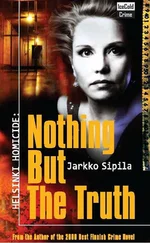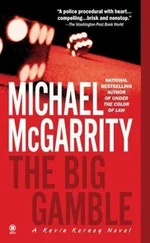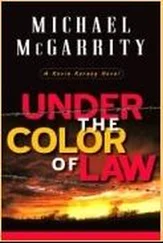Michael McGarrity - Nothing But Trouble
Здесь есть возможность читать онлайн «Michael McGarrity - Nothing But Trouble» весь текст электронной книги совершенно бесплатно (целиком полную версию без сокращений). В некоторых случаях можно слушать аудио, скачать через торрент в формате fb2 и присутствует краткое содержание. Жанр: Триллер, на английском языке. Описание произведения, (предисловие) а так же отзывы посетителей доступны на портале библиотеки ЛибКат.
- Название:Nothing But Trouble
- Автор:
- Жанр:
- Год:неизвестен
- ISBN:нет данных
- Рейтинг книги:4 / 5. Голосов: 1
-
Избранное:Добавить в избранное
- Отзывы:
-
Ваша оценка:
- 80
- 1
- 2
- 3
- 4
- 5
Nothing But Trouble: краткое содержание, описание и аннотация
Предлагаем к чтению аннотацию, описание, краткое содержание или предисловие (зависит от того, что написал сам автор книги «Nothing But Trouble»). Если вы не нашли необходимую информацию о книге — напишите в комментариях, мы постараемся отыскать её.
Nothing But Trouble — читать онлайн бесплатно полную книгу (весь текст) целиком
Ниже представлен текст книги, разбитый по страницам. Система сохранения места последней прочитанной страницы, позволяет с удобством читать онлайн бесплатно книгу «Nothing But Trouble», без необходимости каждый раз заново искать на чём Вы остановились. Поставьте закладку, и сможете в любой момент перейти на страницу, на которой закончили чтение.
Интервал:
Закладка:
Sara took in the raw look of self-recrimination on Kerney’s face. For some reason he’d put himself under a microscope and come up sorely lacking as a parent. “What happened in Santa Fe, Kerney?”
“Patrick got pushed around by a bully at the preschool. When I got there, the worst of it was over, but all he wanted was you, his real home, and his real friends.”
“Oh, Kerney, of course he would want his mother,” Sara said. “He’s only three.”
Kerney shook his head. “It can’t be that easily rationalized, and I can’t stand the thought of you in Iraq and Patrick in Montana. I’d feel terrible. He stays with me. I’ll call Johnny Jordan in the morning and tell him I won’t be going to the Bootheel to work on the movie.”
“Maybe the two of you should go,” Sara said.
Kerney looked away and stared stubbornly out the living room window.
“It might help the both of you keep your minds off things,” she added.
“Not possible. Besides, who’d care for him while I’m working?”
“I’m sure the film company provides tutors for the child actors and nannies for the children of the stars. I’d be a lot happier knowing the two of you were off having some fun. Do it for me.”
He switched his gaze from the window to Sara. “You can’t be serious.”
She met his stubborn blue eyes with a smile. “I am. And when you get back from the Bootheel, buy Patrick his pony.”
Kerney’s eyes softened. “Are those my orders?”
“If you please.”
The week ended in a rush. Movers came to pack and box, the realtor showed the house to prospective buyers, and a charity sent a truck for the donations. Kerney sold Sara’s SUV to a dealer and rented a car for their last two days together. On Friday morning they got up early and Kerney drove her to Fort Belvoir, where he and Patrick spent a hour with her at the hospitality center before she had to leave for her final block of instruction and then a flight to Baghdad.
He watched her crisply walk away, smile over her shoulder, throw a kiss, and wave. He threw a kiss back, smiling as brightly as he could, holding on tightly to Patrick’s hand to keep him from running after her. He thought about roadside bombs, mortars, rocket-propelled grenades, snipers, and shrapnel, and prayed that no harm would come to her.
Patrick cried and tugged to free himself from Kerney’s grasp. He picked him up, wiped the tears away, and hugged him tightly. “It’s just you and me again, sport,” he whispered in his son’s ear as Sara disappeared from view.
Patrick sniffled and wrapped his arms tightly around Kerney’s neck.
Chapter Eleven
The morning after his interrogation of George Spalding, Hugh Fitzmaurice prepared his reports and submitted them to the district court. At the proceeding later in the day the judge denied Spalding bail and remanded him, at the request of the prosecution, to Cloverhill Prison.
Feeling pleased about it all, Fitzmaurice took the afternoon off and spent the remainder of the day on the putting green at the Rathfarnham golf course near his house, until it was time for Edna to come home from work.
After a lovely weekend capped by a leisurely Sunday motor trip to visit his sister and her family in the town of Trim, Fitzmaurice returned to work on Monday to find that the Spalding case had been turned upside down. Someone had retained a top-flight Dublin solicitor to represent Spalding. The solicitor had visited with the attorney general on his client’s behalf and asked that the charges be dropped, arguing that Spalding’s confession had been coerced and subterfuge had been used to compel him to make false accusations against Thomas Carrier.
Fitzmaurice also found out that other cunning machinations were afoot. The Americans and the Canadians had joined forces and proposed to the minister of justice that if the extraditions were expedited, Spalding would be allowed to plead guilty to desertion from the U.S. Army, sentenced to thirty days incarceration in a military stockade, and then immediately handed over to Canadian authorities.
But the crowning bit of news came when Noel Clancy told him that a petition to the judge would be made that very Monday morning asking for the proceedings to be closed, which, under Irish law, effectively barred any written publication or public broadcast of the particulars surrounding the case.
“It seems we’ve been dealt a cold deck of cards,” Clancy had said.
“Or the Americans have sweetened the pot by offering to outsource a thousand or more jobs to a wholly owned Irish subsidiary to keep the Celtic Tiger roaring,” Fitzmaurice replied.
“You have a very pessimistic view of the world.”
“No,” Fitzmaurice said, “it’s just politics I don’t like.”
“Well, let it go, Hugh. You’ve done your job and now it’s in the hands of the politicians, whether you like it or not. Don’t go off and dig yourself a pit to fall into.”
At his office that morning Fitzmaurice placed a call to Sara Brannon to inform her of the situation, only to be told that she’d been reassigned and was no longer at the Pentagon. After completing a summary report on the Spalding case he faxed the official notification of Spalding’s capture to Interpol, the Royal Canadian Mounted Police, and the Pentagon, before leaving to visit Cloverhill Prison.
Located in Clondalkin, five miles south of the city on the bank of River Camac, Cloverhill was a modern facility that housed over four hundred inmates. Inside he met with the assistant governor of the institution and asked to see Spalding’s visitor records. According to the sign-in roster the solicitor representing Spalding had visited him last Saturday, accompanied by another man, one Major Stedman, a United States Marine Corps officer attached to the American embassy.
When Fitzmaurice asked if there might be any surveillance video of the solicitor and the Marine officer, he was escorted to a closed-circuit monitoring station and shown a clip of the two men registering at the visitors reception area. Major Stedman was one of the men who’d bustled Sara Brannon off to the airport.
He left the prison feeling both angry and dispirited, and the next day he went about his job trying to sort out what, if anything, he could do on his own to stop the cover-up. All of his reports and supplemental information had been sealed by the court, and he was obligated to let the matter drop. But surely there had to be a way to get around it. He had DVD copies of Spalding’s and Paquette’s interrogations, but he needed to hit upon a scheme that would allow him to put them to use without making a target of himself.
On Wednesday he had an idea that took him to Spalding’s motor yacht. He searched it, and the following morning he took a page from Spalding’s book of tricks and, using an alias, bought an inexpensive mobile phone with prepaid minutes. On St. Stephen’s Green he stood across the street from Paquette’s hotel, slipped one of the forged documents he’d found hidden on the motor yacht into an envelope, addressed it to Paquette, sought out a young lad passing by, and asked him to deliver it to the hotel bellman.
“What’s in for me, then?” the lad asked in a distinct Irish brogue that left no doubt of his Dublin roots.
“Ten euros,” Fitzmaurice replied. “Here are five for you now. Tell the bellman to delivery it straightaway and give him this fiver for his trouble. You’ll have your second five when you report back to me that it’s done.”
The young boy took the envelope, stuffed the bills in his pocket, and gazed up at Fitzmaurice with mischief in his eyes. Before he could dart away ten euros richer, his job left undone, Fitzmaurice grabbed him by the scruff of the neck, opened his jacket, and let him take a good long look at his holstered handgun.
Читать дальшеИнтервал:
Закладка:
Похожие книги на «Nothing But Trouble»
Представляем Вашему вниманию похожие книги на «Nothing But Trouble» списком для выбора. Мы отобрали схожую по названию и смыслу литературу в надежде предоставить читателям больше вариантов отыскать новые, интересные, ещё непрочитанные произведения.
Обсуждение, отзывы о книге «Nothing But Trouble» и просто собственные мнения читателей. Оставьте ваши комментарии, напишите, что Вы думаете о произведении, его смысле или главных героях. Укажите что конкретно понравилось, а что нет, и почему Вы так считаете.












